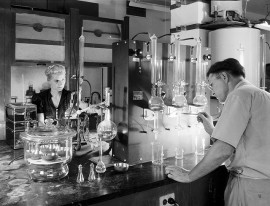GMOs, or genetically modified organisms, are a pretty hot topic. We are starting to see arguments for and against and the average exerciser may wonder how it all applies to them. What should we be thinking about here?
ARE GMOs SAFE?
I don’t know. I don’t know nearly enough about the science of genetic modification to have any idea. I would however, like to re-examine the question in a way I have advocated for in the past. Why exactly are we putting ourselves in the position of needing to ask?
Pro-GMO constituencies will argue that genetic modification is nothing new. Dogs such as chihuahuas and great danes are, through breeding practices, genetically modified and we have no problem with it. Similarly, some natural modifications occur without human intervention such as in the case of the sweet potato. This vegetable, it is now believed, was modified through a natural process in which bacteria inserted extra genes into the potato’s DNA. Given these facts, one could argue, there is no reason to fear and stigmatize genetic modification performed by humans. (1,2)
This is all true, however…
WHY ARE WE IN THIS POSITION?
The above argument misses the point. The process in of itself might not be patently bad, but what are the motivations, goals, and underlying causes surrounding the decision? Genetic modification in modern times is often rooted in unwise human behavior. As example, the most well known GMOs are probably ’round up ready’ seeds. These seeds exist because we have come to rely on chemicals to deal with pest management, creating the need for plants that are genetically engineered to withstand the chemicals. And when those chemicals become less effective, we must respond with new rounds of genetic engineering for new and/or more powerful chemical inputs. (3,4,5) What we need to be doing is finding ways to avoid the pitfalls of industrial, monoculture farming, probably by returning to more natural farming methods such as crop rotation. In any event, comparing this situation to a dachshund or a sweet potato is hardly instructive.
CONCLUSION – LET’S BE CAREFUL TO NOT CONFUSE ISSUES
The point I am trying to make is that this is not simply an argument over whether or not GMOs are safe or healthy. This is about whether or not we should be creating the need in the first place. When deciding whether or not to buy GMO free don’t make it about fear of the safety or be mislead into thinking it will be more or less healthy. Make it about understanding where this product is coming from and whether or not you agree with the system they are a part of.
SOURCES:
1. http://www.npr.org/2015/05/09/404661850/if-science-could-clone-a-mammoth-could-it-save-an-elephant
3. Naylor, Rosamond L. (Editor). The Evolving Sphere of Food Security. Oxford; Oxford University Press, 2014
4. Kirschenmann, Frederick L. Cultivating an Ecological Conscience. Berkeley, CA: Counterpoint, 2010
5. Pollan, Michael. The Omnivore’s Dilemma. New York, NY: Penguin, 2006
RELATED:



So true! The nuances of this debate are far more important than being "pro" or "anti." Thanks for spreading the message!